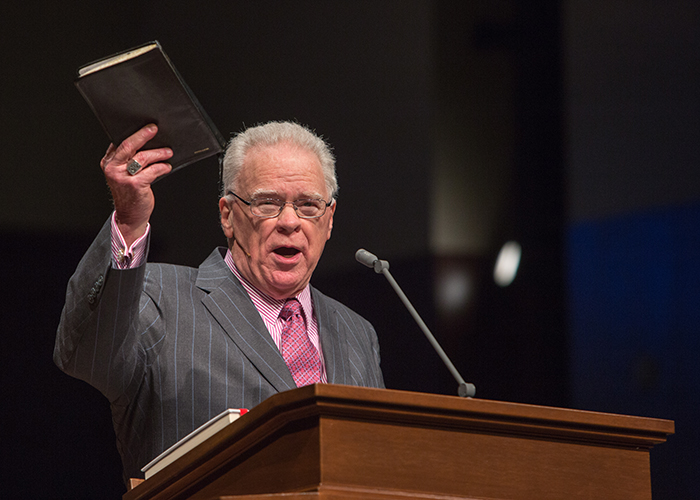Patterson launches spring sermon series on Titus

“The doctrine of election is the glue that holds the soteriology of the New Testament together,” said Southwestern Seminary President Paige Patterson during a sermon on Titus 1:1-4 entitled “Why Election is a Critical Doctrine.” This Jan. 25 message was the first in Patterson’s spring sermon series on the book of Titus that he has titled, “The Witness of Christ in a Depraved Culture.”
Regarding the challenging nature of the oft-debated doctrine of election, Patterson urged pastors not to neglect preaching it. “The doctrine of election is in the Bible,” he said. “And he who does not preach the whole counsel of God is guilty before God.”
Though Patterson acknowledged that the doctrine of election is a mystery “known and understood only in the heart of God,” he said what can be certain is that it offers a promise. This promise is that one’s relationship with Christ cannot be broken.
Patterson continued that this doctrine also reminds Christians of the One who remains steadfast. “It guarantees that no matter what happens in the world, Christ is on His throne and will prevail,” he said. “The world is out of control as it propels itself to ultimate destruction, but God’s hand is on every moment of it, and we will prevail with Him.”
Quoting Titus 1:2, Patterson then discussed “the hope of eternal life” promised to Christians who place their faith in Jesus Christ. This promise, he said, reflects a definition of hope that is unique to Scripture.
“Hope in the New Testament is simply an unrealized promise of God,” Patterson said. “In the New Testament, you hope in something that is absolutely certain; it just has not occurred yet.”
Patterson then stressed the importance of sharing this message of hope with unbelievers, particularly through preaching. “This is why we emphasize preaching here [at Southwestern] as we do,” he said. “We believe it is God’s chosen method for the communication of the Gospel.” Whether through personal witness or preaching to a congregation, Patterson added, God uses these moments of Gospel proclamation to “meet the spiritual needs of the person to whom the messenger speaks.”
In closing, Patterson noted the significance of the concluding phrase of verse 4, “Grace and peace from God the Father and Christ Jesus our Savior.” Grace and peace, he explained, are things one cannot attain apart from Christ.
“The only peace that you will ever have is through the grace of God,” Patterson said. “And in that moment of agonizing self-examination and repentance, when man cries out to God, the Bible says that ‘the peace of God that passes all understanding will guard your mind and heart in Jesus Christ.’”
To download, watch or listen to sermons from Patterson’s series on Titus, visit swbts.edu/chapel.



